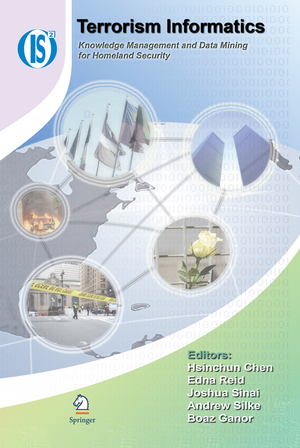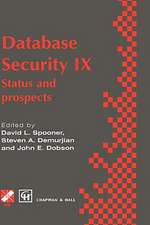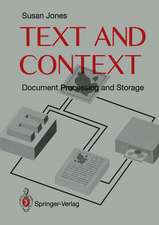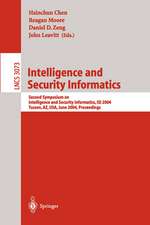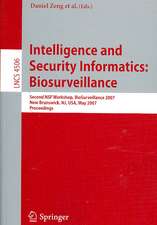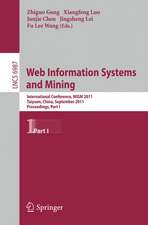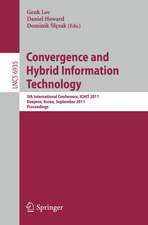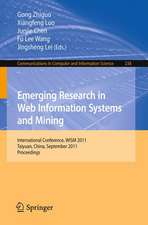Terrorism Informatics: Knowledge Management and Data Mining for Homeland Security: Integrated Series in Information Systems, cartea 18
Editat de Hsinchun Chen, Edna Reid, Joshua Sinai, Andrew Silke, Boaz Ganoren Limba Engleză Hardback – 2 iul 2008
TERRORISM INFORMATICS: Knowledge Management and Data Mining for Homeland Security will provide an interdisciplinary and comprehensive survey of the state-of-the-art of terrorism informatics domain along three basic dimensions: methodological issues in terrorism research; information infusion techniques to support terrorism prevention, detection, and response; and legal, social, privacy, and data confidentiality challenges and approaches.
| Toate formatele și edițiile | Preț | Express |
|---|---|---|
| Paperback (1) | 711.89 lei 6-8 săpt. | |
| Springer Us – 31 oct 2014 | 711.89 lei 6-8 săpt. | |
| Hardback (1) | 816.38 lei 38-44 zile | |
| Springer Us – 2 iul 2008 | 816.38 lei 38-44 zile |
Din seria Integrated Series in Information Systems
- 15%
 Preț: 646.62 lei
Preț: 646.62 lei - 20%
 Preț: 996.07 lei
Preț: 996.07 lei - 20%
 Preț: 1272.94 lei
Preț: 1272.94 lei -
 Preț: 389.11 lei
Preț: 389.11 lei - 20%
 Preț: 998.04 lei
Preț: 998.04 lei - 15%
 Preț: 654.43 lei
Preț: 654.43 lei - 20%
 Preț: 1933.71 lei
Preț: 1933.71 lei -
 Preț: 388.52 lei
Preț: 388.52 lei - 15%
 Preț: 646.11 lei
Preț: 646.11 lei - 15%
 Preț: 667.71 lei
Preț: 667.71 lei - 15%
 Preț: 711.89 lei
Preț: 711.89 lei -
 Preț: 393.52 lei
Preț: 393.52 lei - 15%
 Preț: 644.82 lei
Preț: 644.82 lei - 18%
 Preț: 955.25 lei
Preț: 955.25 lei - 5%
 Preț: 1280.25 lei
Preț: 1280.25 lei - 15%
 Preț: 586.55 lei
Preț: 586.55 lei - 15%
 Preț: 638.11 lei
Preț: 638.11 lei - 20%
 Preț: 1277.24 lei
Preț: 1277.24 lei - 20%
 Preț: 1215.12 lei
Preț: 1215.12 lei - 20%
 Preț: 638.37 lei
Preț: 638.37 lei - 5%
 Preț: 1801.57 lei
Preț: 1801.57 lei - 18%
 Preț: 952.72 lei
Preț: 952.72 lei - 15%
 Preț: 653.14 lei
Preț: 653.14 lei - 20%
 Preț: 995.75 lei
Preț: 995.75 lei - 20%
 Preț: 649.28 lei
Preț: 649.28 lei
Preț: 816.38 lei
Preț vechi: 1060.23 lei
-23% Nou
Puncte Express: 1225
Preț estimativ în valută:
156.23€ • 162.12$ • 130.58£
156.23€ • 162.12$ • 130.58£
Carte tipărită la comandă
Livrare economică 11-17 martie
Preluare comenzi: 021 569.72.76
Specificații
ISBN-13: 9780387716121
ISBN-10: 0387716122
Pagini: 558
Ilustrații: XLII, 558 p.
Dimensiuni: 155 x 235 x 28 mm
Greutate: 1.11 kg
Ediția:2008
Editura: Springer Us
Colecția Springer
Seria Integrated Series in Information Systems
Locul publicării:New York, NY, United States
ISBN-10: 0387716122
Pagini: 558
Ilustrații: XLII, 558 p.
Dimensiuni: 155 x 235 x 28 mm
Greutate: 1.11 kg
Ediția:2008
Editura: Springer Us
Colecția Springer
Seria Integrated Series in Information Systems
Locul publicării:New York, NY, United States
Public țintă
Professional/practitionerCuprins
Methodological Issues in Terrorism Research.- Domain Mapping of Contemporary Terrorism Research.- Research on Terrorism.- Who Are the Key Figures in ‘Terrorism Studies’?.- Interviewing Terrorists.- Resolving a Terrorist Insurgency by Addressing Its Root Causes.- A Quantitative Analysis of ‘Root Causes of Conflict’.- Countering Terrorism with Knowledge.- Toward a Target-specific Method of Threat Assessment.- Identifying and Exploiting Group Learning Patterns for Counterterrorism.- Homeland Insecurity.- Terrorism Informatics to Support Prevention, Detection, and Response.- Case Study of Jihad on the Web.- Studying Global Extremist Organizations' Internet Presence Using the DarkWeb Attribute System.- Content Analysis of Jihadi Extremist Groups' Videos.- Analysis of Affect Intensities in Extremist Group Forums.- Document Selection for Extracting Entity and Relationship Instances of Terrorist Events.- Data Distortion Methods and Metrics in a Terrorist Analysis System.- Content-Based Detection of Terrorists Browsing the Web Using an Advanced Terror Detection System (ATDS).- Text Mining the Biomedical Literature for Identification of Potential Virus/Bacterium as Bio-Terrorism Weapons.- Leveraging One-Class SVM and Semantic Analysis to Detect Anomalous Content.- Individual and Collective Analysis of Anomalies in Message Traffic.- Addressing Insider Threat through Cost-Sensitive Document Classification.- Using Web Mining and Social Network Analysis to Study The Emergence of Cyber Communities In Blogs.- Automatic Extraction of Deceptive Behavioral Cues from Video.- Situational Awareness Technologies for Disaster Response.
Recenzii
From the reviews:
"The title of this book might imply, at first sight, a US-centric approach to the topic, but in fact, the contributions are not only from the US, but also from Canada … India, and Israel. … A particularly good feature of this book is the back matter included at the end of each chapter: suggested readings, online resources, and discussion questions … . This edited volume should appeal to the growing terrorism informatics research community, graduate students, and readers in the wider community … ." (John Fulcher, ACM Computing Reviews, May, 2009)
"The title of this book might imply, at first sight, a US-centric approach to the topic, but in fact, the contributions are not only from the US, but also from Canada … India, and Israel. … A particularly good feature of this book is the back matter included at the end of each chapter: suggested readings, online resources, and discussion questions … . This edited volume should appeal to the growing terrorism informatics research community, graduate students, and readers in the wider community … ." (John Fulcher, ACM Computing Reviews, May, 2009)
Notă biografică
The lead author is an editor for the IEEE Int. conference on Intelligence and Security Informatics and the founder of ISI conferences.
Textul de pe ultima copertă
Terrorism informatics has been defined as the application of advanced methodologies, information fusion and analysis techniques to acquire, integrate process, analyze, and manage the diversity of terrorism-related information for international and homeland security-related applications. The wide variety of methods used in terrorism informatics are derived from Computer Science, Informatics, Statistics, Mathematics, Linguistics, Social Sciences, and Public Policy and these methods are involved in the collection of huge amounts of information from varied and multiple sources and of many types in numerous languages. Information fusion and information technology analysis techniques—which include data mining, data integration, language translation technologies, and image and video processing—play central roles in the prevention, detection, and remediation of terrorism.
Terrorism Informatics: Knowledge Management and Data Mining for Homeland Security will provide an interdisciplinary and comprehensive survey of the state-of-the-art in the terrorism informatics domain along three basic dimensions: methodological issues in terrorism research; information infusion techniques to support terrorism prevention, detection, and response; and legal, social, privacy, and data confidentiality challenges and approaches. Featuring contributions by leading researchers and practitioners, illustrative case studies, and applications of terrorism informatics techniques, the book will be an essential resource for scientists, security professionals, counterterrorism experts, and policy makers.
Terrorism Informatics: Knowledge Management and Data Mining for Homeland Security will provide an interdisciplinary and comprehensive survey of the state-of-the-art in the terrorism informatics domain along three basic dimensions: methodological issues in terrorism research; information infusion techniques to support terrorism prevention, detection, and response; and legal, social, privacy, and data confidentiality challenges and approaches. Featuring contributions by leading researchers and practitioners, illustrative case studies, and applications of terrorism informatics techniques, the book will be an essential resource for scientists, security professionals, counterterrorism experts, and policy makers.
Caracteristici
Emphasizes the cutting-edge concepts, technologies, and practices that are being developed in terrorism informatics to meet today’s worldwide challenges Each of the 24 chapters in the book has been developed by leading expert on the chapter topic. Each chapter comprehensively reviews of the past and recent research work in the chapter area and many chapters include detailed case studies Includes supplementary material: sn.pub/extras
